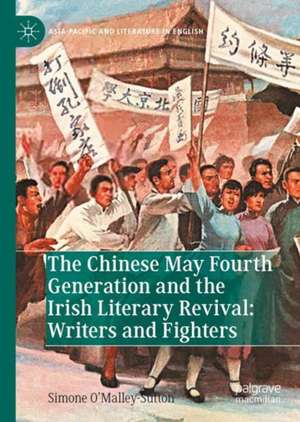The Chinese May Fourth Generation and the Irish Literary Revival: Writers and Fighters: Asia-Pacific and Literature in English
Autor Simone O’Malley-Suttonen Limba Engleză Hardback – 7 oct 2023
Preț: 569.00 lei
Preț vechi: 711.25 lei
-20% Nou
Puncte Express: 854
Preț estimativ în valută:
108.89€ • 112.82$ • 90.88£
108.89€ • 112.82$ • 90.88£
Carte disponibilă
Livrare economică 01-15 martie
Livrare express 15-21 februarie pentru 38.74 lei
Preluare comenzi: 021 569.72.76
Specificații
ISBN-13: 9789819952687
ISBN-10: 9819952689
Pagini: 425
Ilustrații: XXXI, 425 p. 25 illus., 7 illus. in color.
Dimensiuni: 148 x 210 x 34 mm
Greutate: 0.7 kg
Ediția:1st ed. 2023
Editura: Springer Nature Singapore
Colecția Palgrave Macmillan
Seria Asia-Pacific and Literature in English
Locul publicării:Singapore, Singapore
ISBN-10: 9819952689
Pagini: 425
Ilustrații: XXXI, 425 p. 25 illus., 7 illus. in color.
Dimensiuni: 148 x 210 x 34 mm
Greutate: 0.7 kg
Ediția:1st ed. 2023
Editura: Springer Nature Singapore
Colecția Palgrave Macmillan
Seria Asia-Pacific and Literature in English
Locul publicării:Singapore, Singapore
Cuprins
1. Introduction.- 2. Yeats and Lu Xun: Postcolonised Modernists?.- 3.How Lu Xun translated Yeats and the Irish Revival.- 4. Yeats’s Reception in China: How Chinese May Fourth Writers Translated Yeats and the Irish Revival.- 5. Tempests in Tenements and Teahouses: A Comparison of Irish Revivalist Seán O’Casey’s trilogy of plays with Lao She’s Teahouse.- 6. Spreading the News Lady Gregory’s Plays Made it all the Way to China! A Gendered Comparison of “Founding Mothers” Lady Gregory in Revivalist Ireland and Qiu Jin in China.- 7. How Was the New Woman Constructed in Revivalist Ireland and May Fourth China? A Comparison of Socialist and Feminist Writers Ding Ling and Eva Gore-Booth.- 8. Irish Revivalist J. M. Synge and Chinese May Fourth Playwright Cao Yu: ‘Boys’ Who ‘Play’ in the Postcolonised Wilderness?.- 9. Did Ye Ever Hear of the Christmas Rising by Liu Bannong? Receptions of the 1916 Irish Easter Rising in Republican era China.- 10. Conclusion
Notă biografică
Simone O’ Malley-Sutton earned her PhD from University College, Cork, Ireland. She lived for six years in Beijing, China and speaks both Chinese and the Irish language. She was awarded the Murphy Irish Fellowship to attend Notre Dame University in Indiana, from 2016-2018. Her interests include Post-colonialism and Gender. In Fall 2017 she was the Teaching Assistant for the “Approaching Asia” module at the Liu Institute in Notre Dame University in Indiana.
Textul de pe ultima copertă
This book examines how the early twentieth-century Irish Renaissance (Irish Literary Revival) inspired the Chinese Renaissance (the May Fourth generation) of writers to make agentic choices and translingual exchanges. It sheds a new light on “May Fourth” and on the Irish Renaissance by establishing that the Irish Literary Revival (1900-1922) provided an alternative decolonizing model of resistance for the Chinese Renaissance to that provided by the western imperial center. The book also argues that Chinese May Fourth intellectuals translated Irish Revivalist plays by W. B. Yeats, Lady Gregory, Seán O’Casey and Synge and that Chinese peasants performed these plays throughout China during the 1920s and 1930s as a form of anti-imperial resistance. Yet this literary exchange was not simply going one way, since Yeats, Lady Gregory, Synge and O’Casey were also influenced by Chinese developments in literature and politics. Therefore this was a reciprocal encounter based on the circulation ofAnti-colonial ideals and mutual transformation.
Caracteristici
Compares the early 20th century Irish Renaissance and the Chinese Renaissance or May Fourth generation of writers Considers the two way choices and exchanges which impacted on both literatures and politics Debates how the encounter was based on the circulation of Anti-colonial ideals and mutual transformation.






